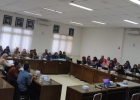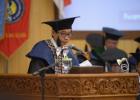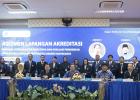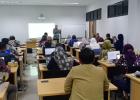You are here
UNY Graduate Students Join Sit-In Class with UPSI Lecturer: Strengthening the Role of Assessment as a Bridge between Teaching and Learning

Twelve students from the Educational Research and Evaluation (ERE) Graduate School of Universitas Negeri Yogyakarta (GS UNY) had the opportunity to participate in a sit-in class and learn about educational assessment with Dr. Nor Hasnida Che Md Ghazali, a lecturer from the Faculty of Human Development, Universiti Pendidikan Sultan Idris (UPSI), Malaysia.
The session took place at the Aminuddin Baki Seminar Room, Faculty of Human Development, UPSI, as part of GS UNY’s international academic visit to UPSI.
Also attending the event was Prof. Dr. Muhammad Nursa’ban, S.Pd, M.Pd., Head of the ERE Master Program at GS UNY. This activity reflects the ongoing collaboration between UNY’s Graduate School and UPSI in strengthening international academic relations, particularly in the field of Educational Measurement and Evaluation.
In her lecture, Dr. Hasnida explained the key principles and vital role of assessment in education. She highlighted that both Malaysia and Indonesia are gradually transitioning from Traditional Assessment to Alternative Assessment models. Traditional assessments, she noted, tend to focus only on measuring students’ ability to provide correct answers to test questions. In contrast, alternative assessments emphasize performance-based tasks that reflect real-life contexts and student experiences.
The class also featured small group discussions. Students were divided into three groups to explore the topic of Formative Assessment—its definition, implementation procedures, challenges in practice, and possible alternative solutions. Representatives from each group then presented their discussion outcomes to the class.
Each group provided examples of lesson materials and described how formative assessment procedures could be applied. The session became an engaging forum for exchanging insights and experiences on how assessment practices are carried out in Indonesia and Malaysia. Many participants observed that some teachers still misunderstand the true purpose of formative assessment—treating it merely as a grading tool rather than as a process for improving teaching and learning.
Responding to the students’ presentations, Dr. Hasnida reinforced the crucial role of formative assessment, which is often overlooked by teachers. She emphasized that formative assessment is not intended for grading students. Instead, as an assessment for learning, it aims to provide feedback and recommendations that help students achieve learning goals more effectively. Ideally, teachers should use formative assessment to offer constructive comments, suggestions, and targeted feedback that guide students toward improvement in subsequent lessons.
Moreover, formative assessment serves as a valuable self-reflection tool for teachers, enabling them to evaluate and enhance their teaching practices. Dr. Hasnida concluded by reminding that while teachers may use similar instruments for both formative and summative assessments, the purpose and interpretation of results must differ, as each type plays a distinct and equally important role in improving the overall quality of education and instruction.
PERPUSTAKAAN
SISTEM INFORMASI
KONTAK KAMI
SEKOLAH PASCASARJANA
Kampus Karangmalang, Yogyakarta 55281
Telp. +62274-550836 (front office)
Fax. +62274-520326
Email: pps@uny.ac.id, humas_pps@uny.ac.id
Website : http://sps.uny.ac.id
FB: pascasarjana UNY
IG: spsuny_official, s2pep_uny
Twitter: OfficialUNY
IG S2 PEP: s2.pep_uny
Copyright © 2026,




